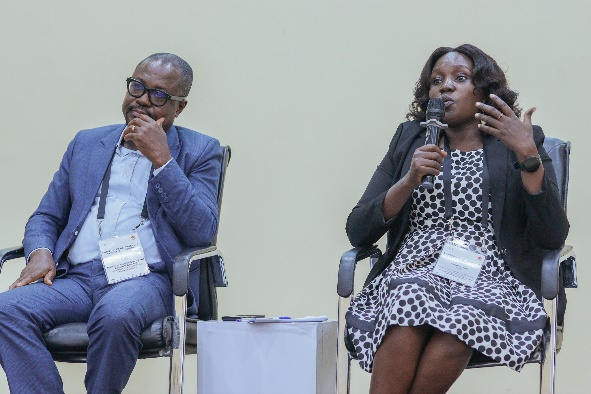
From August 27–29, 2025, we joined fellow researchers, policymakers, and youth leaders at the ISSER Conference Centre, University of Ghana, for the Youth Futures in Dignified and Fulfilling Work in Africa Community of Practice convening. The three days were more than just another conference-they were an eye-opening journey into how Africa can reimagine work for its young people.

The gathering brought together partners from Mastercard Foundation, Institute of Statistical, Social and Economic Research (ISSER), African Institute for Development Policy, Human Sciences Research Council, the Centre for the Future of Work, World Data Lab, Partnership for Economic Policy, University of Pretoria’s Centre for Future of Work and Caribou Digital. Delegates came from across the continent-Ghana, Uganda, South Africa, Kenya, Senegal, Nigeria, and Ethiopia-carrying with them diverse experiences and ideas on what dignified and fulfilling work should look like.
The convening was part of the Mastercard-funded “The Youth Futures Portfolio in Dignified and Fulfilling Work in Africa”, a research program running from 2025 to 2027 across Ghana, Ethiopia, Nigeria, Senegal, Rwanda, Uganda, Kenya, and South Africa.
ISSER is leading a consortium of four organizations to address one of the project’s key pillars: Indigenous Enterprises in the Informal Economy. Within this consortium, ICED serves as a partner under ISSER and has specific responsibility for overseeing research activities in Uganda, Kenya, and Rwanda. The research focuses on exploring the potential for innovation and supportive frameworks to foster the growth of youth-owned Indigenous enterprises in Africa.
What struck us most was how intentionally young people were placed at the heart of the convening. From storytelling to panel discussions, youth voices shaped the dialogue. For us, it was refreshing to move beyond tokenism and fostered genuine engagement where lived realities, perspectives, and critiques informed the outcomes.
Youth unemployment remains a pressing challenge in Africa, averaging over 20% and reaching as high as 70–80% in some countries. While this poses a heavy burden, it also represents one of the continent’s greatest opportunities. By channeling the energy, creativity, and innovation of young people, governments and development partners can unlock pathways for inclusive growth and sustainable development.
At ICED, we believe that evidence and evaluation are only powerful if they reflect the voices of the communities most affected. The convening echoed this belief, showing that young people are not just research subjects but co-creators of knowledge and solutions.
One highlight was the Africa Youth Employment Clock, which revealed that over 80% of Africa’s youth are in the informal economy. This challenged the common view of informality as purely survivalist. Instead, the conversations reframed it as a hub of creativity, entrepreneurship, and resilience. We left convinced that policies must stop marginalizing informal work and instead recognize its dynamism and potential.

Another recurring theme was policy co-creation. Youth cannot just be beneficiaries of policies; they must be co-designers and co-implementers. Mentorship and capacity-building were also identified as vital to equip young people with the skills to sit confidently at the policymaking table.
The role of AI and digital tools was debated with passion. We saw the promise of AI in curating job opportunities, guiding career paths, and making labour markets more inclusive. But there was also a strong caution: if not designed sensitively, AI risks excluding marginalized youth and undermining indigenous enterprises.
The convening was not just about talk-it paved the way for concrete outputs. In the coming months, we will see policy briefs, cross-country comparative studies, youth-led video blogs, and the rollout of an AI toolkit that can guide the future of work.
For us at ICED, this convening reaffirmed the importance of evidence-driven and youth-centred approaches in shaping Africa’s future of work. It strengthened our sense of agency as actors in this space. Most importantly, it reinforced a truth we hold deeply at ICED: Africa’s youth are not passive beneficiaries of development-they are active co-creators of dignified, resilient, and fulfilling work futures.
Africa stands at a crossroads. With the majority of its population under 25, the decisions we make today will define generations. We cannot afford to exclude youth from the conversation-or from the solutions.
At ICED, we are committed to ensuring that evidence, evaluation, and youth voices shape policies and investments that unlock dignified and fulfilling work across the continent. But this requires collective effort.